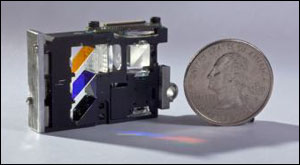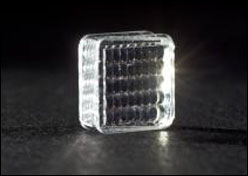一种新的偏振光栅偏振化技术使得液晶(Liquid Crystal,LC)投影机的能量效率提高了近一倍,而体积更小、成本更低、电池寿命更长且发热量更小。
所有的液晶投影机都使用偏振光。但是高光效的光源如 LED 等产生的都是非偏振光(自然光)。所以液晶投影机在使用 LED 光源之前必须将其转换为偏振光(偏振化,物理学上称之为起偏)。
传统的起偏方法主要是让非偏振光波通过一个偏振片(这时称之为起偏器)来完成的,这种过程会损失超过 50% 的光能量。这些损失的巨大能量转变为热能,使得传统的液晶投影机需要强力的冷却风扇来帮助散热,也带来了较大的噪声。
现在,北卡罗来纳州立大学(North Carolina State University)开发出一种新的技术,使得大约有 90% 的非偏振光能够被投影机利用。研究团队自制了一台小的投影机来演示这一技术。
这个小的单一单元装置由四个不能活动的部分组成,它们可以嵌入到智能手机、平板电脑或者其它设备中。非偏振光首先通过一个透镜组,会聚为一个点状网格。然后通过一个偏振光栅。该偏振光栅是由一层附着在玻璃基底上的液晶薄膜制成的,可以将入射的光点分离为偏振状态相互正交(偏振方向相互垂直)的两组光点。再通过一个百页窗式波片 —— 一个具有清晰的特定模式的波片集合 —— 形成具有相同偏振状态的光点。最后,第二个透镜组将这些光点会聚成为一个单一均匀的光束。
右图即是研究人员开发的偏振光栅起偏系统,简称 PGPCS。它可以显著提高液晶投影机的能量利用效率。这使得电池驱动的液晶投影机的工作时间是原来的两倍,而使用相同的能量,投影机可以比以前的亮度更高。因为只有大约 10% 的能量转换为热量,新技术还可以减少液晶投影机对散热风扇的需要。
via NCSU
相关论文
Efficient and monolithic polarization conversion system based on a polarization grating
Authors: Jihwan Kim, Ravi K. Komanduri, Kristopher F. Lawler, Michael J. Escuti, North Carolina State University; D. Jason Kekas, ImagineOptix Corporation
Published: July 10, 2012, Applied Optics
Abstract: We introduce a new polarization conversion system (PCS) based on a liquid-crystal polarization grating (PG) and louvered wave plate. A simple arrangement of these elements laminated between two microlens arrays results in a compact and monolithic element, with the ability to nearly completely convert unpolarized input into linearly polarized output across most of the visible bandwidth. In our first prototypes, this PG-PCS approach manifests nearly 90% conversion efficiency of unpolarized to polarized for +/-11° input light divergence, leading to an energy efficient picoprojector that presents high efficacy (12 lm/W) with good color uniformity.©
本文发表于水景一页。永久链接:<https://cnzhx.net/photonics/news/light-efficiency-in-lc-projectors-nearly-doubled/>。转载请保留此信息及相应链接。

